Business Environment Analysis: ALDI's PESTEL and SWOT
VerifiedAdded on 2020/12/24
|13
|4255
|365
Report
AI Summary
This report provides a detailed analysis of ALDI's business environment, focusing on the application of PESTEL and SWOT frameworks. The introduction establishes the context of the business environment and introduces ALDI as a case study, highlighting its global presence and retail sector operations. The report then applies PESTEL analysis, examining political, economic, social, technological, environmental, and legal factors impacting ALDI's operations, both positively and negatively, with specific examples. The SWOT analysis assesses ALDI's internal strengths and weaknesses, along with external opportunities and threats, providing insights into its competitive position and strategic planning. The analysis considers factors such as pricing, product mix, employee satisfaction, business expansion, and market competition. The conclusion summarizes the key findings and implications of the analysis, offering a comprehensive view of ALDI's business environment and strategic considerations.
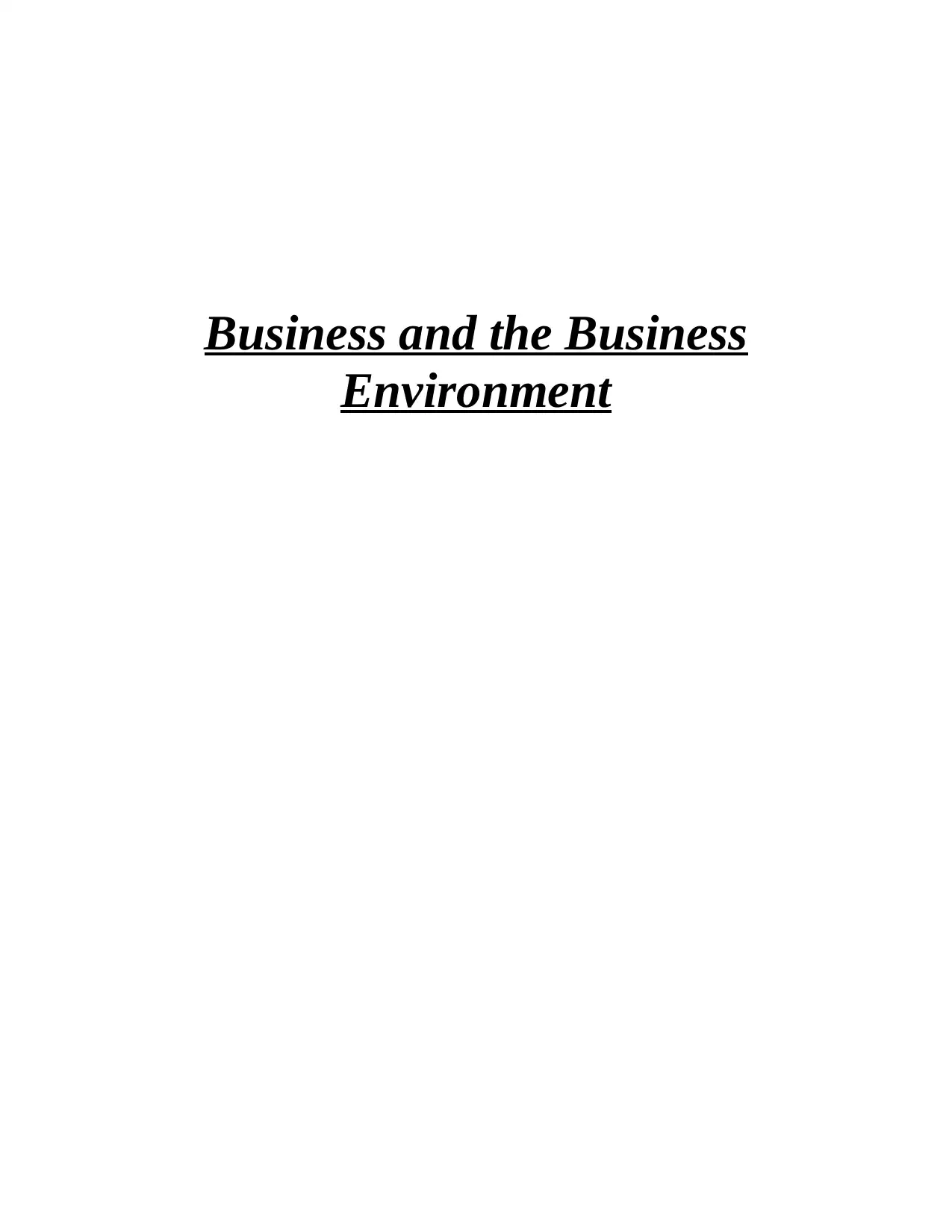
Business and the Business
Environment
Environment
Paraphrase This Document
Need a fresh take? Get an instant paraphrase of this document with our AI Paraphraser
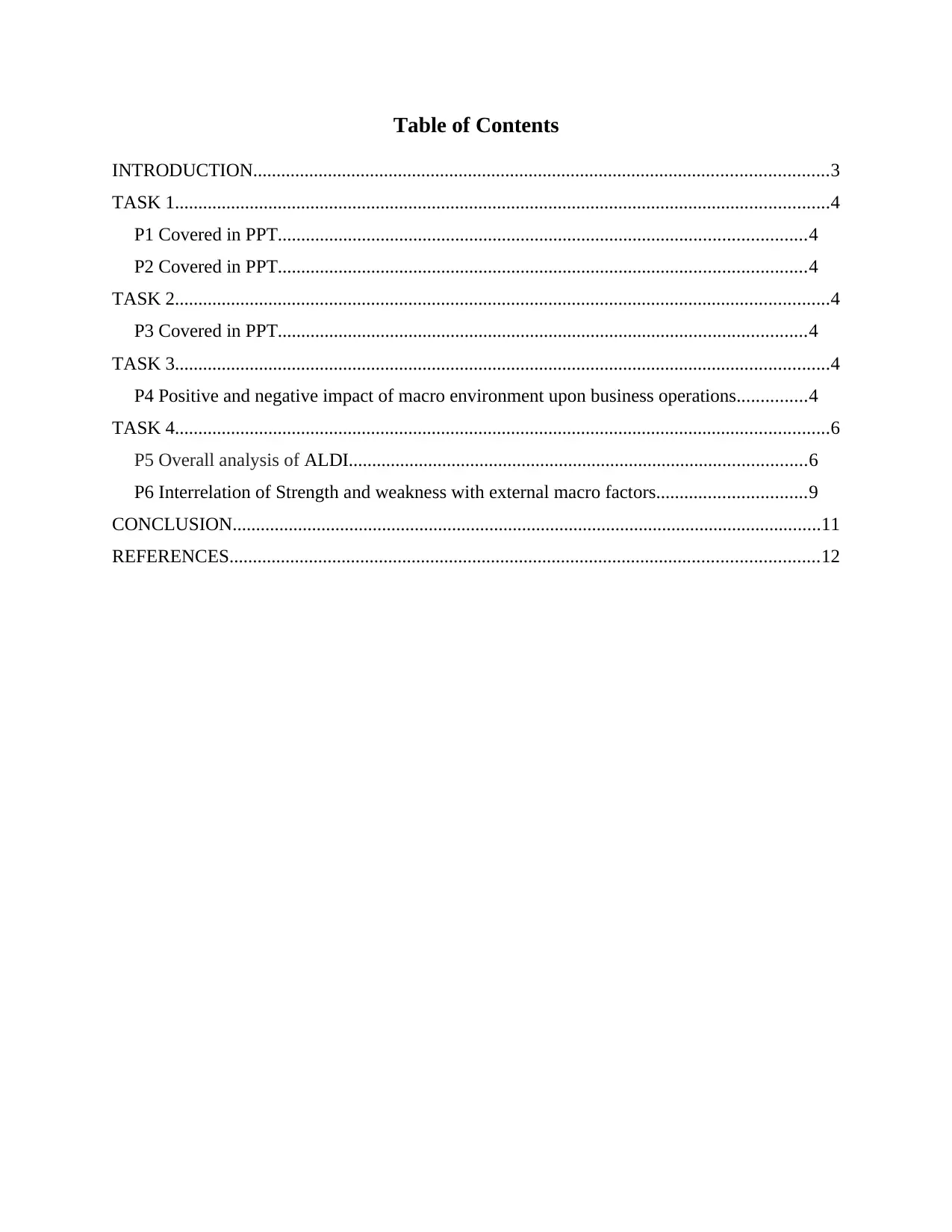
Table of Contents
INTRODUCTION...........................................................................................................................3
TASK 1............................................................................................................................................4
P1 Covered in PPT.................................................................................................................4
P2 Covered in PPT.................................................................................................................4
TASK 2............................................................................................................................................4
P3 Covered in PPT.................................................................................................................4
TASK 3............................................................................................................................................4
P4 Positive and negative impact of macro environment upon business operations...............4
TASK 4............................................................................................................................................6
P5 Overall analysis of ALDI..................................................................................................6
P6 Interrelation of Strength and weakness with external macro factors................................9
CONCLUSION..............................................................................................................................11
REFERENCES..............................................................................................................................12
INTRODUCTION...........................................................................................................................3
TASK 1............................................................................................................................................4
P1 Covered in PPT.................................................................................................................4
P2 Covered in PPT.................................................................................................................4
TASK 2............................................................................................................................................4
P3 Covered in PPT.................................................................................................................4
TASK 3............................................................................................................................................4
P4 Positive and negative impact of macro environment upon business operations...............4
TASK 4............................................................................................................................................6
P5 Overall analysis of ALDI..................................................................................................6
P6 Interrelation of Strength and weakness with external macro factors................................9
CONCLUSION..............................................................................................................................11
REFERENCES..............................................................................................................................12
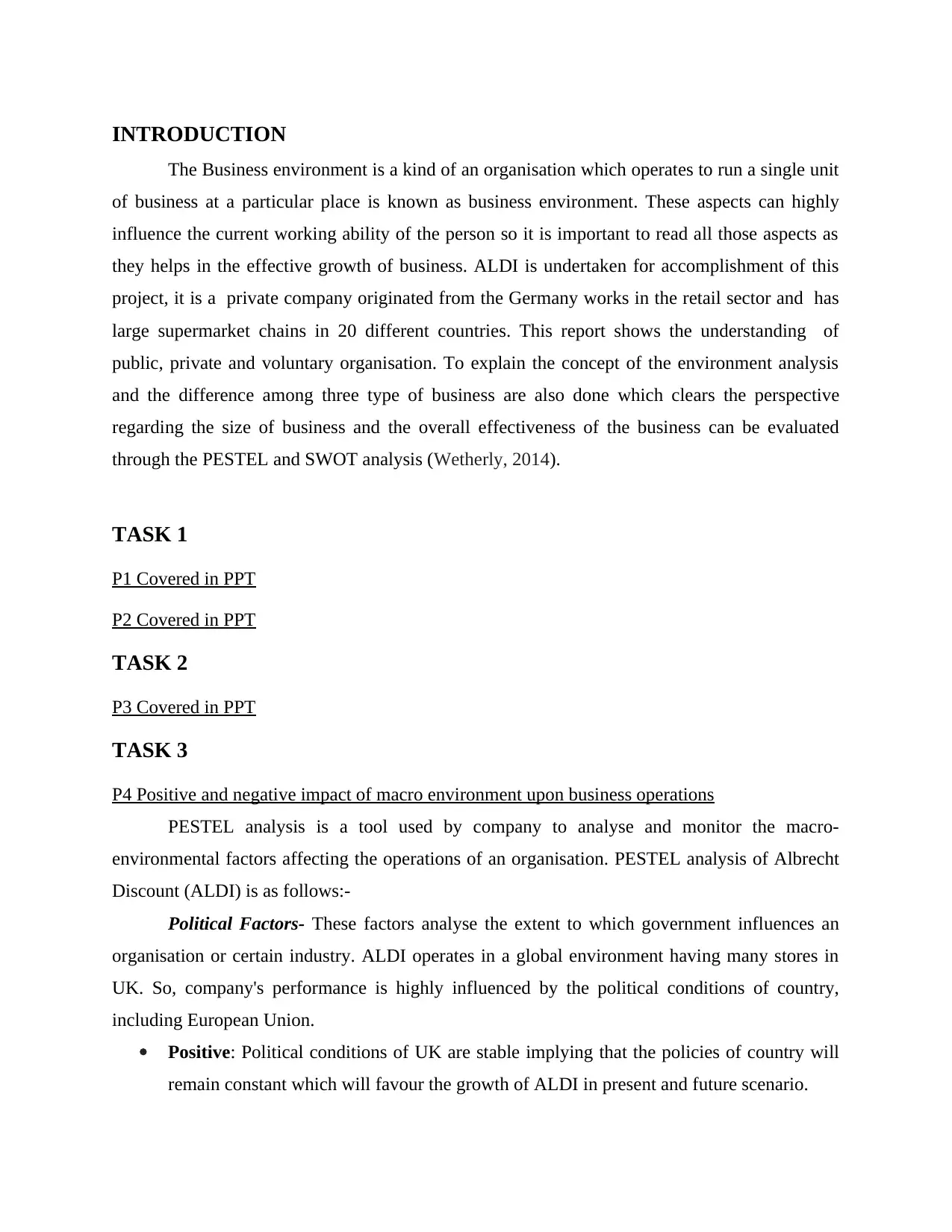
INTRODUCTION
The Business environment is a kind of an organisation which operates to run a single unit
of business at a particular place is known as business environment. These aspects can highly
influence the current working ability of the person so it is important to read all those aspects as
they helps in the effective growth of business. ALDI is undertaken for accomplishment of this
project, it is a private company originated from the Germany works in the retail sector and has
large supermarket chains in 20 different countries. This report shows the understanding of
public, private and voluntary organisation. To explain the concept of the environment analysis
and the difference among three type of business are also done which clears the perspective
regarding the size of business and the overall effectiveness of the business can be evaluated
through the PESTEL and SWOT analysis (Wetherly, 2014).
TASK 1
P1 Covered in PPT
P2 Covered in PPT
TASK 2
P3 Covered in PPT
TASK 3
P4 Positive and negative impact of macro environment upon business operations
PESTEL analysis is a tool used by company to analyse and monitor the macro-
environmental factors affecting the operations of an organisation. PESTEL analysis of Albrecht
Discount (ALDI) is as follows:-
Political Factors- These factors analyse the extent to which government influences an
organisation or certain industry. ALDI operates in a global environment having many stores in
UK. So, company's performance is highly influenced by the political conditions of country,
including European Union.
Positive: Political conditions of UK are stable implying that the policies of country will
remain constant which will favour the growth of ALDI in present and future scenario.
The Business environment is a kind of an organisation which operates to run a single unit
of business at a particular place is known as business environment. These aspects can highly
influence the current working ability of the person so it is important to read all those aspects as
they helps in the effective growth of business. ALDI is undertaken for accomplishment of this
project, it is a private company originated from the Germany works in the retail sector and has
large supermarket chains in 20 different countries. This report shows the understanding of
public, private and voluntary organisation. To explain the concept of the environment analysis
and the difference among three type of business are also done which clears the perspective
regarding the size of business and the overall effectiveness of the business can be evaluated
through the PESTEL and SWOT analysis (Wetherly, 2014).
TASK 1
P1 Covered in PPT
P2 Covered in PPT
TASK 2
P3 Covered in PPT
TASK 3
P4 Positive and negative impact of macro environment upon business operations
PESTEL analysis is a tool used by company to analyse and monitor the macro-
environmental factors affecting the operations of an organisation. PESTEL analysis of Albrecht
Discount (ALDI) is as follows:-
Political Factors- These factors analyse the extent to which government influences an
organisation or certain industry. ALDI operates in a global environment having many stores in
UK. So, company's performance is highly influenced by the political conditions of country,
including European Union.
Positive: Political conditions of UK are stable implying that the policies of country will
remain constant which will favour the growth of ALDI in present and future scenario.
⊘ This is a preview!⊘
Do you want full access?
Subscribe today to unlock all pages.

Trusted by 1+ million students worldwide
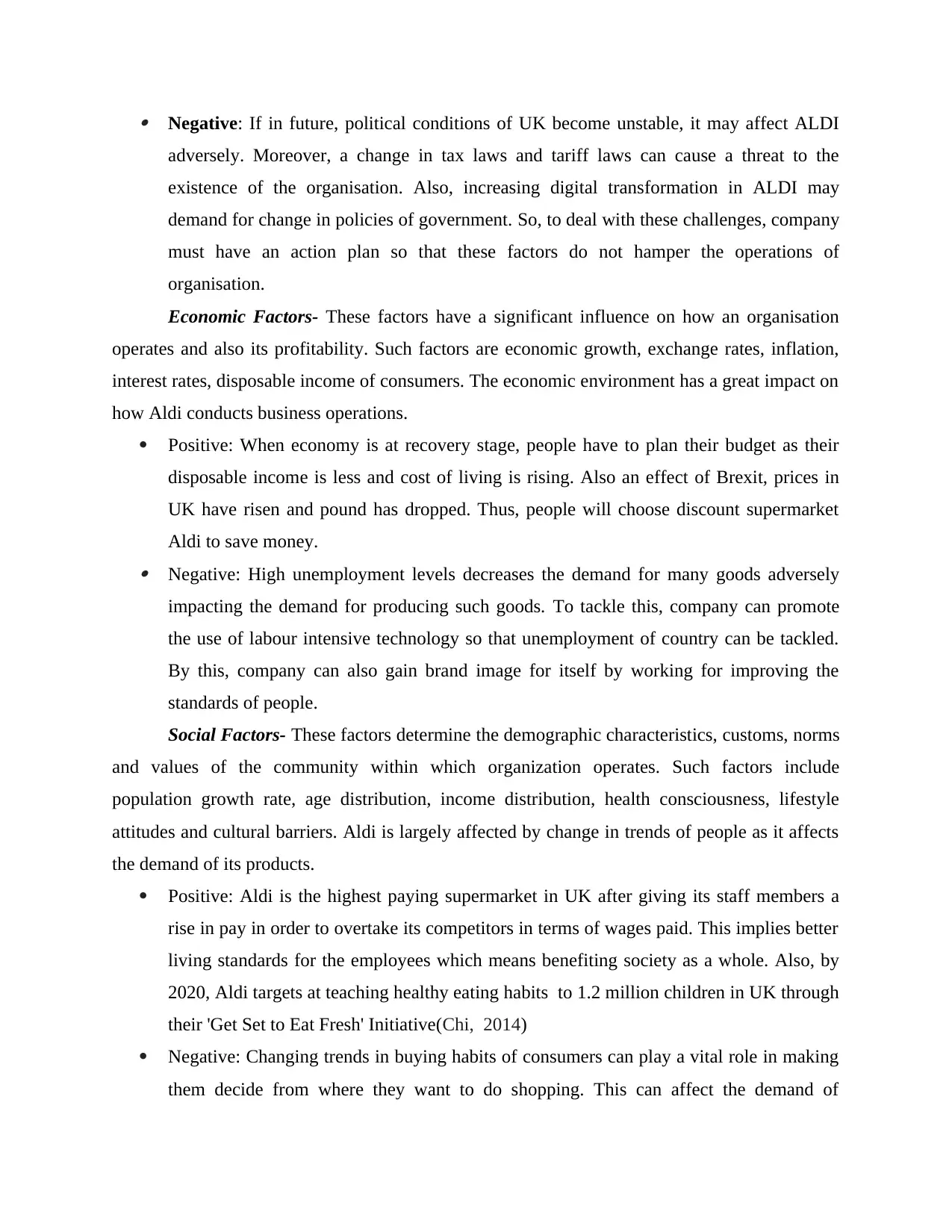
Negative: If in future, political conditions of UK become unstable, it may affect ALDI
adversely. Moreover, a change in tax laws and tariff laws can cause a threat to the
existence of the organisation. Also, increasing digital transformation in ALDI may
demand for change in policies of government. So, to deal with these challenges, company
must have an action plan so that these factors do not hamper the operations of
organisation.
Economic Factors- These factors have a significant influence on how an organisation
operates and also its profitability. Such factors are economic growth, exchange rates, inflation,
interest rates, disposable income of consumers. The economic environment has a great impact on
how Aldi conducts business operations.
Positive: When economy is at recovery stage, people have to plan their budget as their
disposable income is less and cost of living is rising. Also an effect of Brexit, prices in
UK have risen and pound has dropped. Thus, people will choose discount supermarket
Aldi to save money. Negative: High unemployment levels decreases the demand for many goods adversely
impacting the demand for producing such goods. To tackle this, company can promote
the use of labour intensive technology so that unemployment of country can be tackled.
By this, company can also gain brand image for itself by working for improving the
standards of people.
Social Factors- These factors determine the demographic characteristics, customs, norms
and values of the community within which organization operates. Such factors include
population growth rate, age distribution, income distribution, health consciousness, lifestyle
attitudes and cultural barriers. Aldi is largely affected by change in trends of people as it affects
the demand of its products.
Positive: Aldi is the highest paying supermarket in UK after giving its staff members a
rise in pay in order to overtake its competitors in terms of wages paid. This implies better
living standards for the employees which means benefiting society as a whole. Also, by
2020, Aldi targets at teaching healthy eating habits to 1.2 million children in UK through
their 'Get Set to Eat Fresh' Initiative(Chi, 2014)
Negative: Changing trends in buying habits of consumers can play a vital role in making
them decide from where they want to do shopping. This can affect the demand of
adversely. Moreover, a change in tax laws and tariff laws can cause a threat to the
existence of the organisation. Also, increasing digital transformation in ALDI may
demand for change in policies of government. So, to deal with these challenges, company
must have an action plan so that these factors do not hamper the operations of
organisation.
Economic Factors- These factors have a significant influence on how an organisation
operates and also its profitability. Such factors are economic growth, exchange rates, inflation,
interest rates, disposable income of consumers. The economic environment has a great impact on
how Aldi conducts business operations.
Positive: When economy is at recovery stage, people have to plan their budget as their
disposable income is less and cost of living is rising. Also an effect of Brexit, prices in
UK have risen and pound has dropped. Thus, people will choose discount supermarket
Aldi to save money. Negative: High unemployment levels decreases the demand for many goods adversely
impacting the demand for producing such goods. To tackle this, company can promote
the use of labour intensive technology so that unemployment of country can be tackled.
By this, company can also gain brand image for itself by working for improving the
standards of people.
Social Factors- These factors determine the demographic characteristics, customs, norms
and values of the community within which organization operates. Such factors include
population growth rate, age distribution, income distribution, health consciousness, lifestyle
attitudes and cultural barriers. Aldi is largely affected by change in trends of people as it affects
the demand of its products.
Positive: Aldi is the highest paying supermarket in UK after giving its staff members a
rise in pay in order to overtake its competitors in terms of wages paid. This implies better
living standards for the employees which means benefiting society as a whole. Also, by
2020, Aldi targets at teaching healthy eating habits to 1.2 million children in UK through
their 'Get Set to Eat Fresh' Initiative(Chi, 2014)
Negative: Changing trends in buying habits of consumers can play a vital role in making
them decide from where they want to do shopping. This can affect the demand of
Paraphrase This Document
Need a fresh take? Get an instant paraphrase of this document with our AI Paraphraser
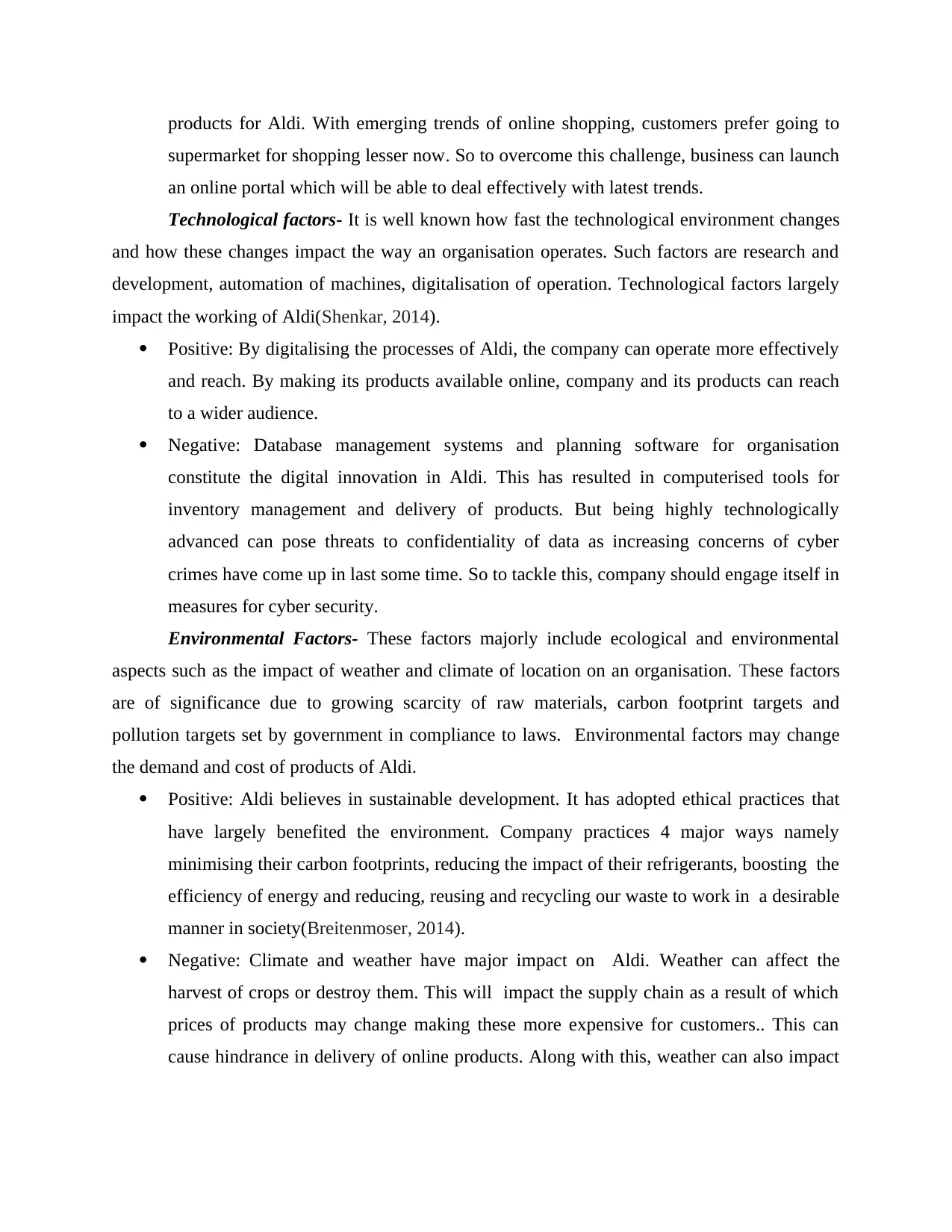
products for Aldi. With emerging trends of online shopping, customers prefer going to
supermarket for shopping lesser now. So to overcome this challenge, business can launch
an online portal which will be able to deal effectively with latest trends.
Technological factors- It is well known how fast the technological environment changes
and how these changes impact the way an organisation operates. Such factors are research and
development, automation of machines, digitalisation of operation. Technological factors largely
impact the working of Aldi(Shenkar, 2014).
Positive: By digitalising the processes of Aldi, the company can operate more effectively
and reach. By making its products available online, company and its products can reach
to a wider audience.
Negative: Database management systems and planning software for organisation
constitute the digital innovation in Aldi. This has resulted in computerised tools for
inventory management and delivery of products. But being highly technologically
advanced can pose threats to confidentiality of data as increasing concerns of cyber
crimes have come up in last some time. So to tackle this, company should engage itself in
measures for cyber security.
Environmental Factors- These factors majorly include ecological and environmental
aspects such as the impact of weather and climate of location on an organisation. These factors
are of significance due to growing scarcity of raw materials, carbon footprint targets and
pollution targets set by government in compliance to laws. Environmental factors may change
the demand and cost of products of Aldi.
Positive: Aldi believes in sustainable development. It has adopted ethical practices that
have largely benefited the environment. Company practices 4 major ways namely
minimising their carbon footprints, reducing the impact of their refrigerants, boosting the
efficiency of energy and reducing, reusing and recycling our waste to work in a desirable
manner in society(Breitenmoser, 2014).
Negative: Climate and weather have major impact on Aldi. Weather can affect the
harvest of crops or destroy them. This will impact the supply chain as a result of which
prices of products may change making these more expensive for customers.. This can
cause hindrance in delivery of online products. Along with this, weather can also impact
supermarket for shopping lesser now. So to overcome this challenge, business can launch
an online portal which will be able to deal effectively with latest trends.
Technological factors- It is well known how fast the technological environment changes
and how these changes impact the way an organisation operates. Such factors are research and
development, automation of machines, digitalisation of operation. Technological factors largely
impact the working of Aldi(Shenkar, 2014).
Positive: By digitalising the processes of Aldi, the company can operate more effectively
and reach. By making its products available online, company and its products can reach
to a wider audience.
Negative: Database management systems and planning software for organisation
constitute the digital innovation in Aldi. This has resulted in computerised tools for
inventory management and delivery of products. But being highly technologically
advanced can pose threats to confidentiality of data as increasing concerns of cyber
crimes have come up in last some time. So to tackle this, company should engage itself in
measures for cyber security.
Environmental Factors- These factors majorly include ecological and environmental
aspects such as the impact of weather and climate of location on an organisation. These factors
are of significance due to growing scarcity of raw materials, carbon footprint targets and
pollution targets set by government in compliance to laws. Environmental factors may change
the demand and cost of products of Aldi.
Positive: Aldi believes in sustainable development. It has adopted ethical practices that
have largely benefited the environment. Company practices 4 major ways namely
minimising their carbon footprints, reducing the impact of their refrigerants, boosting the
efficiency of energy and reducing, reusing and recycling our waste to work in a desirable
manner in society(Breitenmoser, 2014).
Negative: Climate and weather have major impact on Aldi. Weather can affect the
harvest of crops or destroy them. This will impact the supply chain as a result of which
prices of products may change making these more expensive for customers.. This can
cause hindrance in delivery of online products. Along with this, weather can also impact
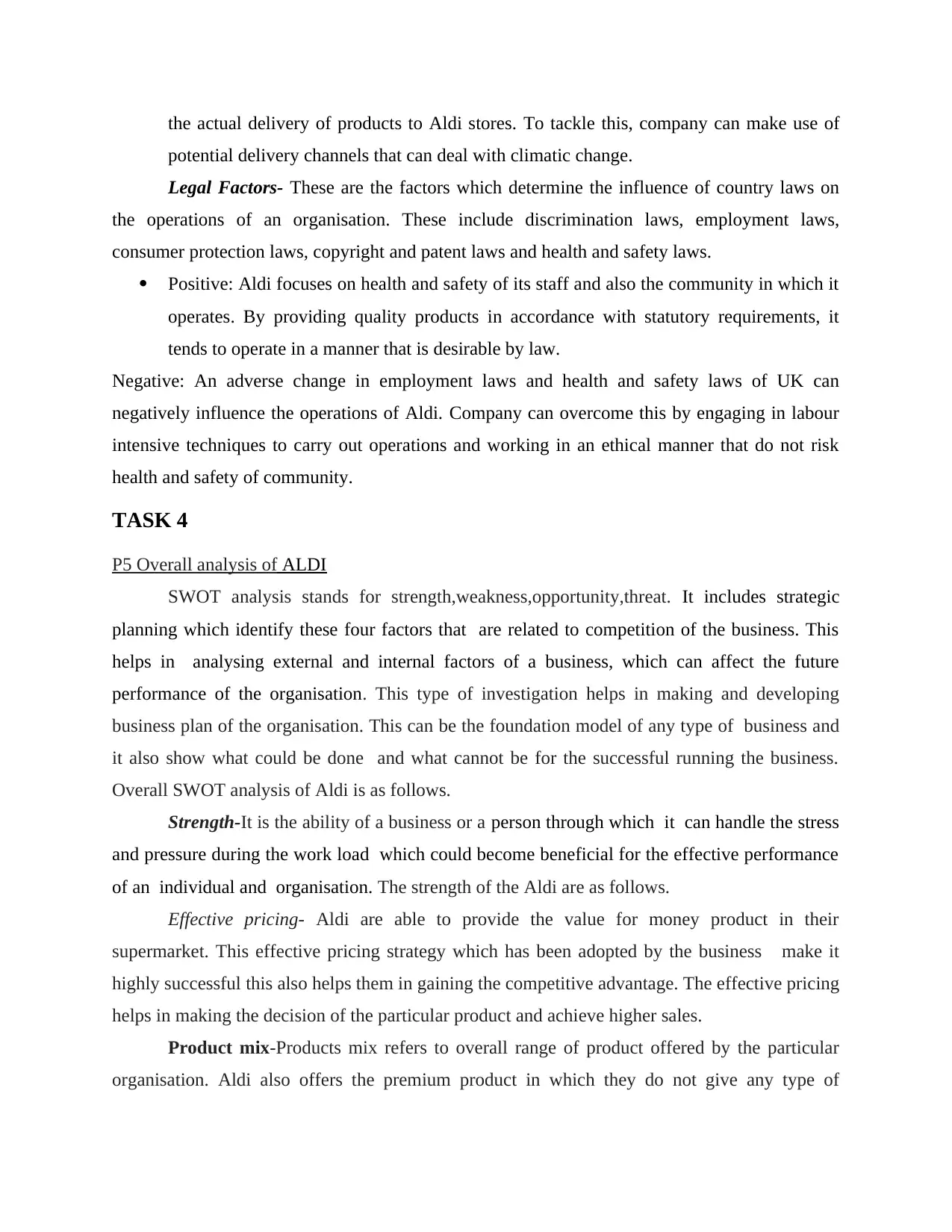
the actual delivery of products to Aldi stores. To tackle this, company can make use of
potential delivery channels that can deal with climatic change.
Legal Factors- These are the factors which determine the influence of country laws on
the operations of an organisation. These include discrimination laws, employment laws,
consumer protection laws, copyright and patent laws and health and safety laws.
Positive: Aldi focuses on health and safety of its staff and also the community in which it
operates. By providing quality products in accordance with statutory requirements, it
tends to operate in a manner that is desirable by law.
Negative: An adverse change in employment laws and health and safety laws of UK can
negatively influence the operations of Aldi. Company can overcome this by engaging in labour
intensive techniques to carry out operations and working in an ethical manner that do not risk
health and safety of community.
TASK 4
P5 Overall analysis of ALDI
SWOT analysis stands for strength,weakness,opportunity,threat. It includes strategic
planning which identify these four factors that are related to competition of the business. This
helps in analysing external and internal factors of a business, which can affect the future
performance of the organisation. This type of investigation helps in making and developing
business plan of the organisation. This can be the foundation model of any type of business and
it also show what could be done and what cannot be for the successful running the business.
Overall SWOT analysis of Aldi is as follows.
Strength-It is the ability of a business or a person through which it can handle the stress
and pressure during the work load which could become beneficial for the effective performance
of an individual and organisation. The strength of the Aldi are as follows.
Effective pricing- Aldi are able to provide the value for money product in their
supermarket. This effective pricing strategy which has been adopted by the business make it
highly successful this also helps them in gaining the competitive advantage. The effective pricing
helps in making the decision of the particular product and achieve higher sales.
Product mix-Products mix refers to overall range of product offered by the particular
organisation. Aldi also offers the premium product in which they do not give any type of
potential delivery channels that can deal with climatic change.
Legal Factors- These are the factors which determine the influence of country laws on
the operations of an organisation. These include discrimination laws, employment laws,
consumer protection laws, copyright and patent laws and health and safety laws.
Positive: Aldi focuses on health and safety of its staff and also the community in which it
operates. By providing quality products in accordance with statutory requirements, it
tends to operate in a manner that is desirable by law.
Negative: An adverse change in employment laws and health and safety laws of UK can
negatively influence the operations of Aldi. Company can overcome this by engaging in labour
intensive techniques to carry out operations and working in an ethical manner that do not risk
health and safety of community.
TASK 4
P5 Overall analysis of ALDI
SWOT analysis stands for strength,weakness,opportunity,threat. It includes strategic
planning which identify these four factors that are related to competition of the business. This
helps in analysing external and internal factors of a business, which can affect the future
performance of the organisation. This type of investigation helps in making and developing
business plan of the organisation. This can be the foundation model of any type of business and
it also show what could be done and what cannot be for the successful running the business.
Overall SWOT analysis of Aldi is as follows.
Strength-It is the ability of a business or a person through which it can handle the stress
and pressure during the work load which could become beneficial for the effective performance
of an individual and organisation. The strength of the Aldi are as follows.
Effective pricing- Aldi are able to provide the value for money product in their
supermarket. This effective pricing strategy which has been adopted by the business make it
highly successful this also helps them in gaining the competitive advantage. The effective pricing
helps in making the decision of the particular product and achieve higher sales.
Product mix-Products mix refers to overall range of product offered by the particular
organisation. Aldi also offers the premium product in which they do not give any type of
⊘ This is a preview!⊘
Do you want full access?
Subscribe today to unlock all pages.

Trusted by 1+ million students worldwide
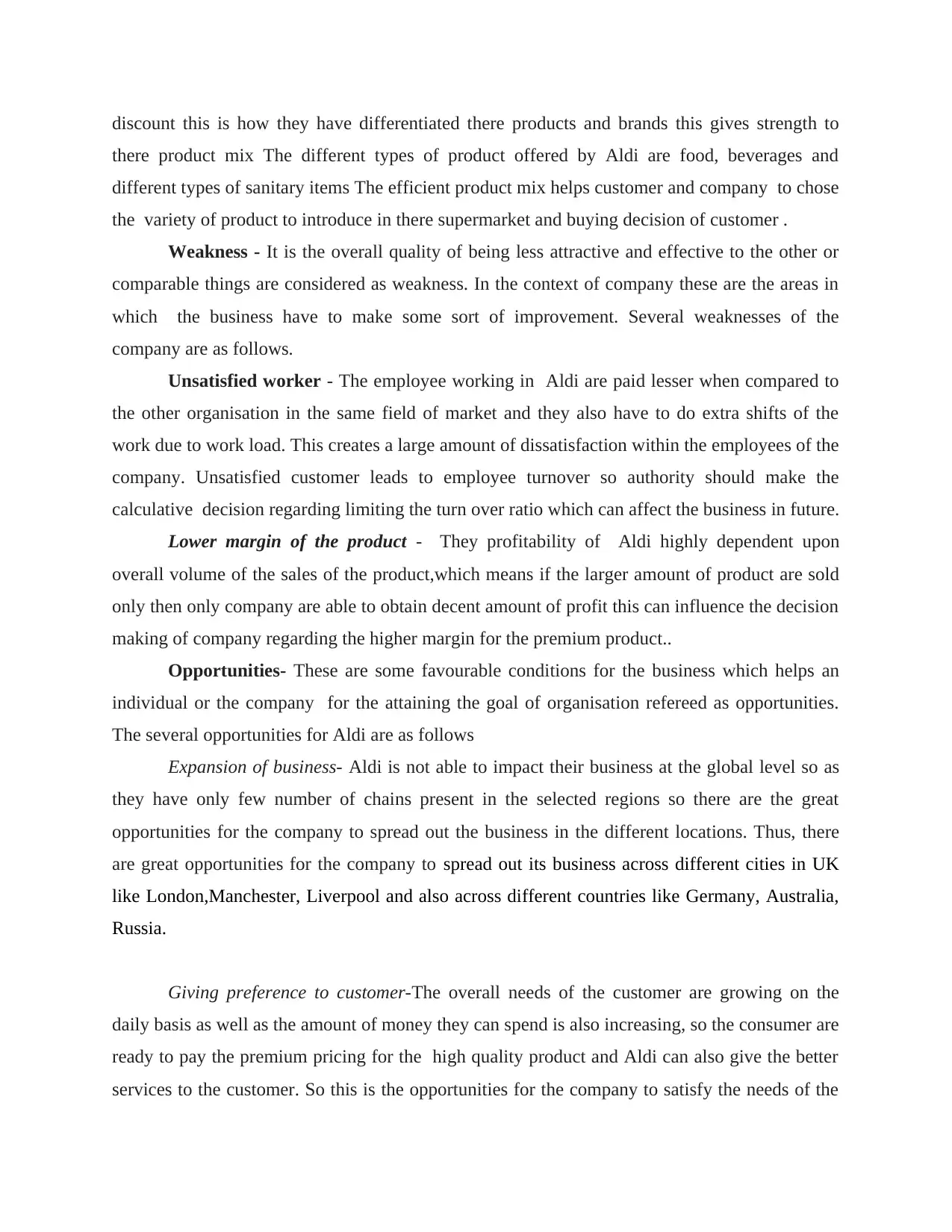
discount this is how they have differentiated there products and brands this gives strength to
there product mix The different types of product offered by Aldi are food, beverages and
different types of sanitary items The efficient product mix helps customer and company to chose
the variety of product to introduce in there supermarket and buying decision of customer .
Weakness - It is the overall quality of being less attractive and effective to the other or
comparable things are considered as weakness. In the context of company these are the areas in
which the business have to make some sort of improvement. Several weaknesses of the
company are as follows.
Unsatisfied worker - The employee working in Aldi are paid lesser when compared to
the other organisation in the same field of market and they also have to do extra shifts of the
work due to work load. This creates a large amount of dissatisfaction within the employees of the
company. Unsatisfied customer leads to employee turnover so authority should make the
calculative decision regarding limiting the turn over ratio which can affect the business in future.
Lower margin of the product - They profitability of Aldi highly dependent upon
overall volume of the sales of the product,which means if the larger amount of product are sold
only then only company are able to obtain decent amount of profit this can influence the decision
making of company regarding the higher margin for the premium product..
Opportunities- These are some favourable conditions for the business which helps an
individual or the company for the attaining the goal of organisation refereed as opportunities.
The several opportunities for Aldi are as follows
Expansion of business- Aldi is not able to impact their business at the global level so as
they have only few number of chains present in the selected regions so there are the great
opportunities for the company to spread out the business in the different locations. Thus, there
are great opportunities for the company to spread out its business across different cities in UK
like London,Manchester, Liverpool and also across different countries like Germany, Australia,
Russia.
Giving preference to customer-The overall needs of the customer are growing on the
daily basis as well as the amount of money they can spend is also increasing, so the consumer are
ready to pay the premium pricing for the high quality product and Aldi can also give the better
services to the customer. So this is the opportunities for the company to satisfy the needs of the
there product mix The different types of product offered by Aldi are food, beverages and
different types of sanitary items The efficient product mix helps customer and company to chose
the variety of product to introduce in there supermarket and buying decision of customer .
Weakness - It is the overall quality of being less attractive and effective to the other or
comparable things are considered as weakness. In the context of company these are the areas in
which the business have to make some sort of improvement. Several weaknesses of the
company are as follows.
Unsatisfied worker - The employee working in Aldi are paid lesser when compared to
the other organisation in the same field of market and they also have to do extra shifts of the
work due to work load. This creates a large amount of dissatisfaction within the employees of the
company. Unsatisfied customer leads to employee turnover so authority should make the
calculative decision regarding limiting the turn over ratio which can affect the business in future.
Lower margin of the product - They profitability of Aldi highly dependent upon
overall volume of the sales of the product,which means if the larger amount of product are sold
only then only company are able to obtain decent amount of profit this can influence the decision
making of company regarding the higher margin for the premium product..
Opportunities- These are some favourable conditions for the business which helps an
individual or the company for the attaining the goal of organisation refereed as opportunities.
The several opportunities for Aldi are as follows
Expansion of business- Aldi is not able to impact their business at the global level so as
they have only few number of chains present in the selected regions so there are the great
opportunities for the company to spread out the business in the different locations. Thus, there
are great opportunities for the company to spread out its business across different cities in UK
like London,Manchester, Liverpool and also across different countries like Germany, Australia,
Russia.
Giving preference to customer-The overall needs of the customer are growing on the
daily basis as well as the amount of money they can spend is also increasing, so the consumer are
ready to pay the premium pricing for the high quality product and Aldi can also give the better
services to the customer. So this is the opportunities for the company to satisfy the needs of the
Paraphrase This Document
Need a fresh take? Get an instant paraphrase of this document with our AI Paraphraser
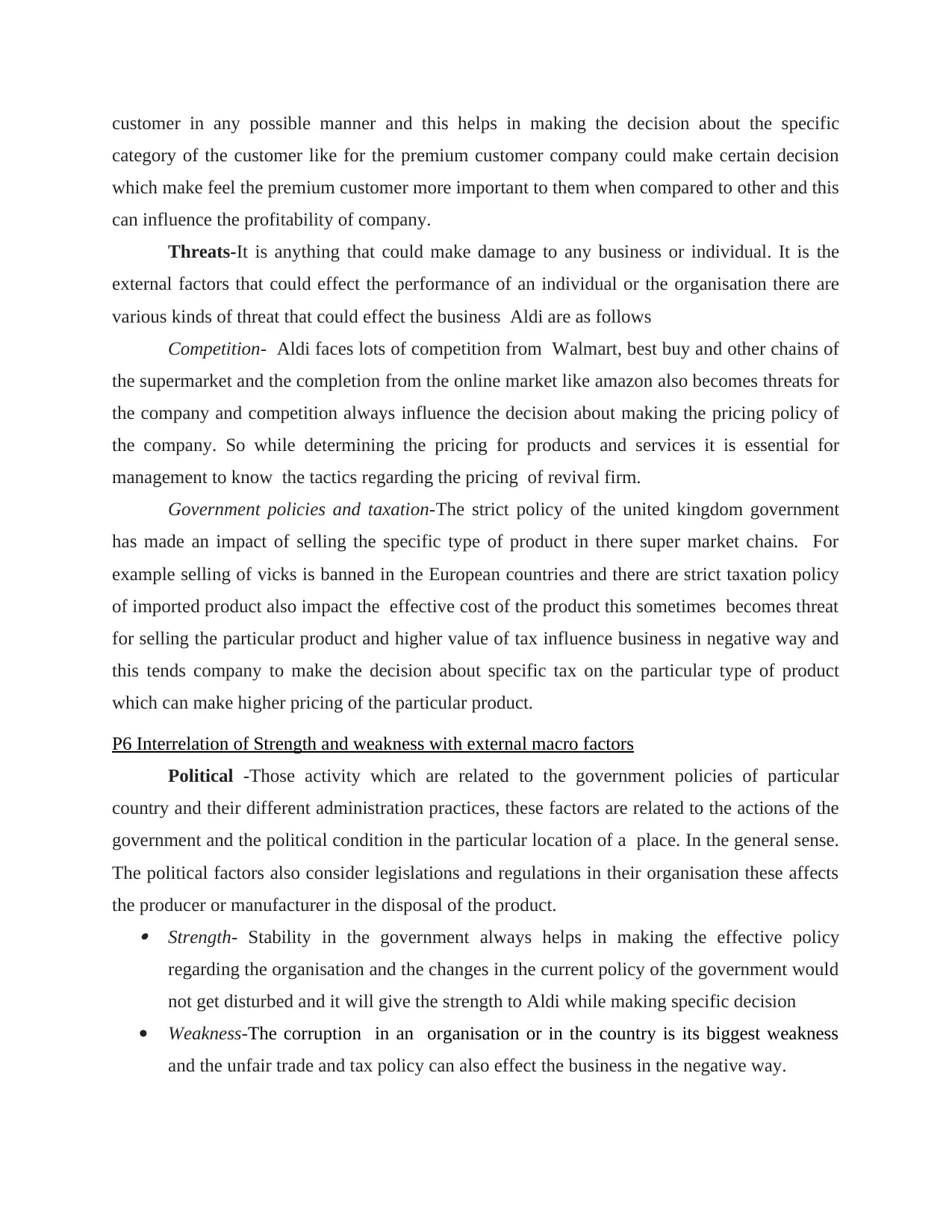
customer in any possible manner and this helps in making the decision about the specific
category of the customer like for the premium customer company could make certain decision
which make feel the premium customer more important to them when compared to other and this
can influence the profitability of company.
Threats-It is anything that could make damage to any business or individual. It is the
external factors that could effect the performance of an individual or the organisation there are
various kinds of threat that could effect the business Aldi are as follows
Competition- Aldi faces lots of competition from Walmart, best buy and other chains of
the supermarket and the completion from the online market like amazon also becomes threats for
the company and competition always influence the decision about making the pricing policy of
the company. So while determining the pricing for products and services it is essential for
management to know the tactics regarding the pricing of revival firm.
Government policies and taxation-The strict policy of the united kingdom government
has made an impact of selling the specific type of product in there super market chains. For
example selling of vicks is banned in the European countries and there are strict taxation policy
of imported product also impact the effective cost of the product this sometimes becomes threat
for selling the particular product and higher value of tax influence business in negative way and
this tends company to make the decision about specific tax on the particular type of product
which can make higher pricing of the particular product.
P6 Interrelation of Strength and weakness with external macro factors
Political -Those activity which are related to the government policies of particular
country and their different administration practices, these factors are related to the actions of the
government and the political condition in the particular location of a place. In the general sense.
The political factors also consider legislations and regulations in their organisation these affects
the producer or manufacturer in the disposal of the product. Strength- Stability in the government always helps in making the effective policy
regarding the organisation and the changes in the current policy of the government would
not get disturbed and it will give the strength to Aldi while making specific decision
Weakness-The corruption in an organisation or in the country is its biggest weakness
and the unfair trade and tax policy can also effect the business in the negative way.
category of the customer like for the premium customer company could make certain decision
which make feel the premium customer more important to them when compared to other and this
can influence the profitability of company.
Threats-It is anything that could make damage to any business or individual. It is the
external factors that could effect the performance of an individual or the organisation there are
various kinds of threat that could effect the business Aldi are as follows
Competition- Aldi faces lots of competition from Walmart, best buy and other chains of
the supermarket and the completion from the online market like amazon also becomes threats for
the company and competition always influence the decision about making the pricing policy of
the company. So while determining the pricing for products and services it is essential for
management to know the tactics regarding the pricing of revival firm.
Government policies and taxation-The strict policy of the united kingdom government
has made an impact of selling the specific type of product in there super market chains. For
example selling of vicks is banned in the European countries and there are strict taxation policy
of imported product also impact the effective cost of the product this sometimes becomes threat
for selling the particular product and higher value of tax influence business in negative way and
this tends company to make the decision about specific tax on the particular type of product
which can make higher pricing of the particular product.
P6 Interrelation of Strength and weakness with external macro factors
Political -Those activity which are related to the government policies of particular
country and their different administration practices, these factors are related to the actions of the
government and the political condition in the particular location of a place. In the general sense.
The political factors also consider legislations and regulations in their organisation these affects
the producer or manufacturer in the disposal of the product. Strength- Stability in the government always helps in making the effective policy
regarding the organisation and the changes in the current policy of the government would
not get disturbed and it will give the strength to Aldi while making specific decision
Weakness-The corruption in an organisation or in the country is its biggest weakness
and the unfair trade and tax policy can also effect the business in the negative way.
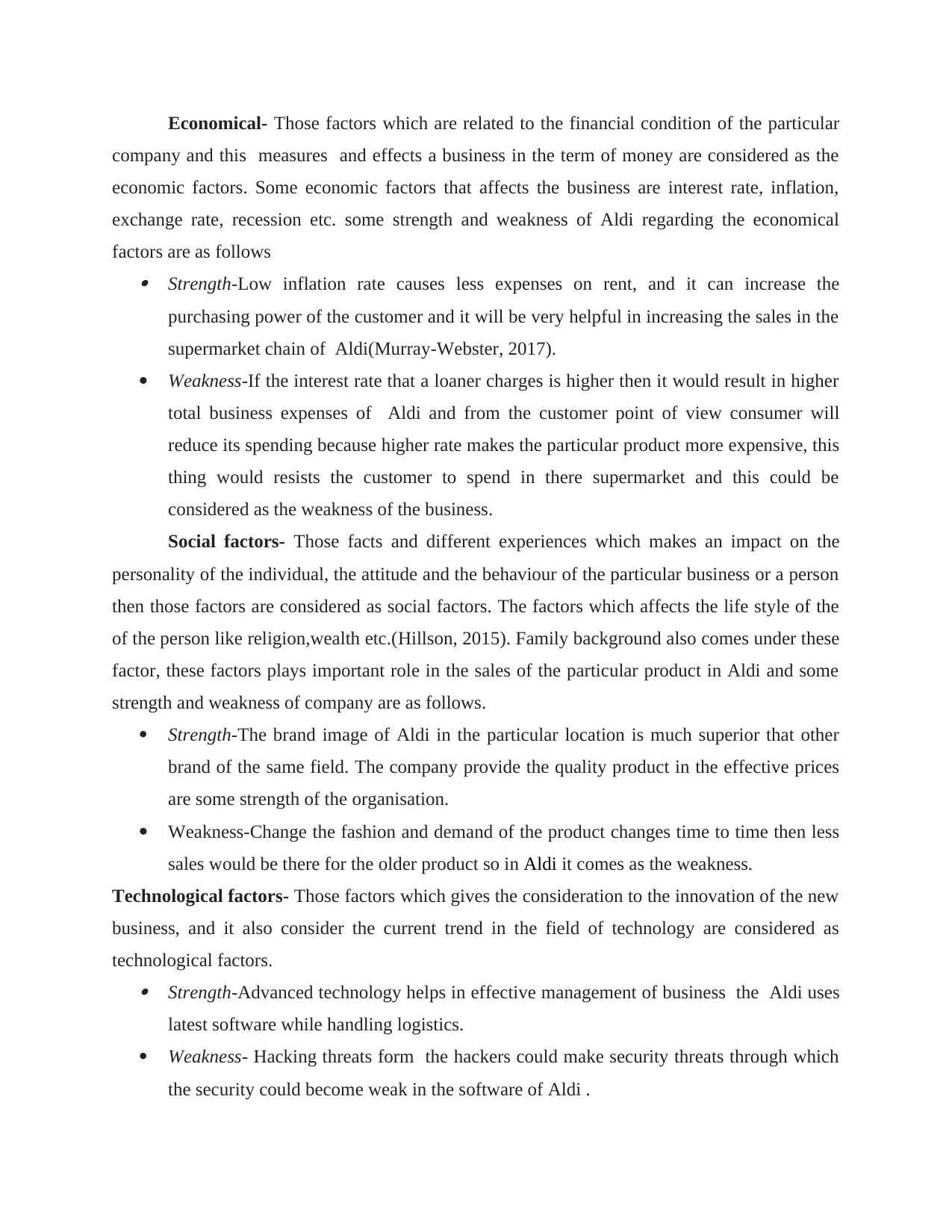
Economical- Those factors which are related to the financial condition of the particular
company and this measures and effects a business in the term of money are considered as the
economic factors. Some economic factors that affects the business are interest rate, inflation,
exchange rate, recession etc. some strength and weakness of Aldi regarding the economical
factors are as follows Strength-Low inflation rate causes less expenses on rent, and it can increase the
purchasing power of the customer and it will be very helpful in increasing the sales in the
supermarket chain of Aldi(Murray-Webster, 2017).
Weakness-If the interest rate that a loaner charges is higher then it would result in higher
total business expenses of Aldi and from the customer point of view consumer will
reduce its spending because higher rate makes the particular product more expensive, this
thing would resists the customer to spend in there supermarket and this could be
considered as the weakness of the business.
Social factors- Those facts and different experiences which makes an impact on the
personality of the individual, the attitude and the behaviour of the particular business or a person
then those factors are considered as social factors. The factors which affects the life style of the
of the person like religion,wealth etc.(Hillson, 2015). Family background also comes under these
factor, these factors plays important role in the sales of the particular product in Aldi and some
strength and weakness of company are as follows.
Strength-The brand image of Aldi in the particular location is much superior that other
brand of the same field. The company provide the quality product in the effective prices
are some strength of the organisation.
Weakness-Change the fashion and demand of the product changes time to time then less
sales would be there for the older product so in Aldi it comes as the weakness.
Technological factors- Those factors which gives the consideration to the innovation of the new
business, and it also consider the current trend in the field of technology are considered as
technological factors. Strength-Advanced technology helps in effective management of business the Aldi uses
latest software while handling logistics.
Weakness- Hacking threats form the hackers could make security threats through which
the security could become weak in the software of Aldi .
company and this measures and effects a business in the term of money are considered as the
economic factors. Some economic factors that affects the business are interest rate, inflation,
exchange rate, recession etc. some strength and weakness of Aldi regarding the economical
factors are as follows Strength-Low inflation rate causes less expenses on rent, and it can increase the
purchasing power of the customer and it will be very helpful in increasing the sales in the
supermarket chain of Aldi(Murray-Webster, 2017).
Weakness-If the interest rate that a loaner charges is higher then it would result in higher
total business expenses of Aldi and from the customer point of view consumer will
reduce its spending because higher rate makes the particular product more expensive, this
thing would resists the customer to spend in there supermarket and this could be
considered as the weakness of the business.
Social factors- Those facts and different experiences which makes an impact on the
personality of the individual, the attitude and the behaviour of the particular business or a person
then those factors are considered as social factors. The factors which affects the life style of the
of the person like religion,wealth etc.(Hillson, 2015). Family background also comes under these
factor, these factors plays important role in the sales of the particular product in Aldi and some
strength and weakness of company are as follows.
Strength-The brand image of Aldi in the particular location is much superior that other
brand of the same field. The company provide the quality product in the effective prices
are some strength of the organisation.
Weakness-Change the fashion and demand of the product changes time to time then less
sales would be there for the older product so in Aldi it comes as the weakness.
Technological factors- Those factors which gives the consideration to the innovation of the new
business, and it also consider the current trend in the field of technology are considered as
technological factors. Strength-Advanced technology helps in effective management of business the Aldi uses
latest software while handling logistics.
Weakness- Hacking threats form the hackers could make security threats through which
the security could become weak in the software of Aldi .
⊘ This is a preview!⊘
Do you want full access?
Subscribe today to unlock all pages.

Trusted by 1+ million students worldwide
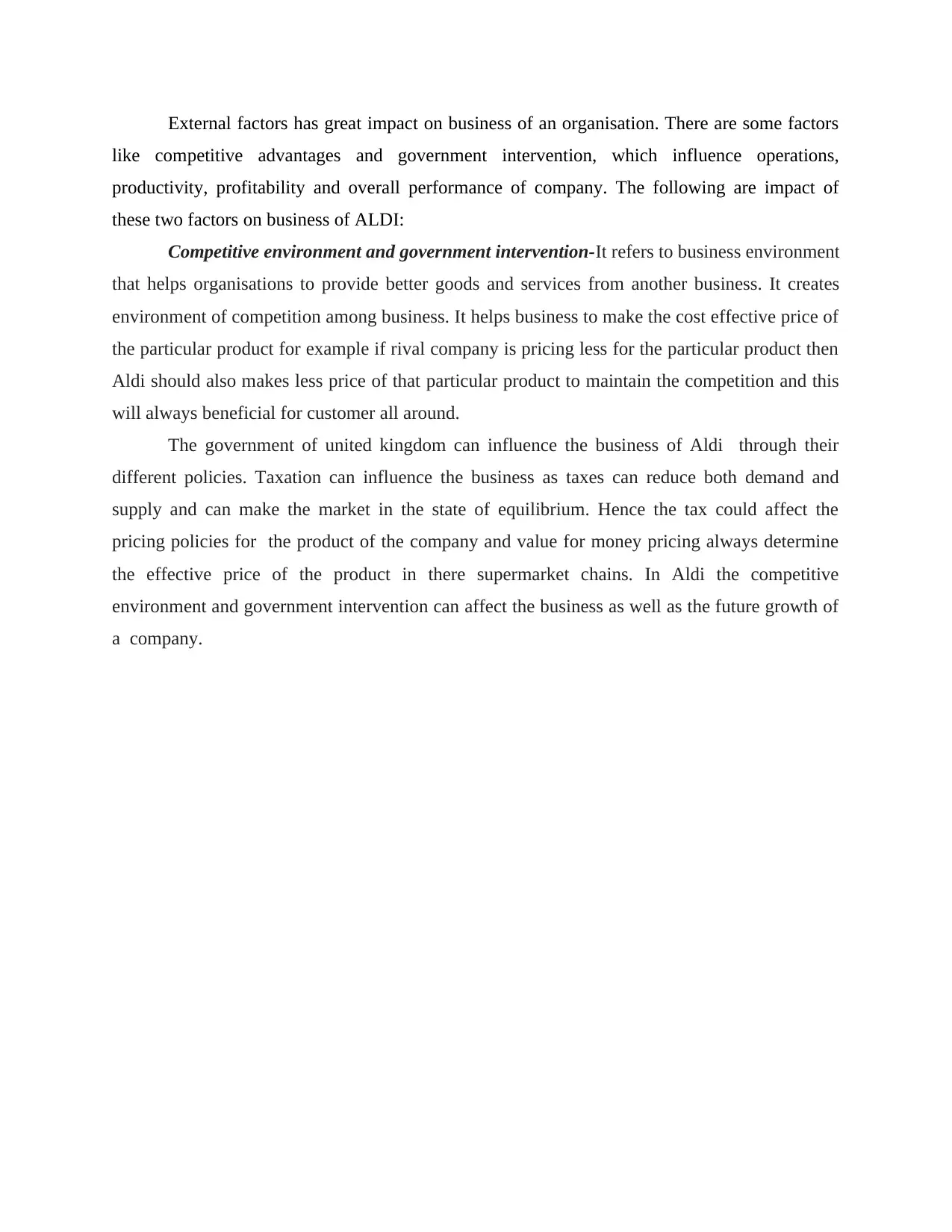
External factors has great impact on business of an organisation. There are some factors
like competitive advantages and government intervention, which influence operations,
productivity, profitability and overall performance of company. The following are impact of
these two factors on business of ALDI:
Competitive environment and government intervention-It refers to business environment
that helps organisations to provide better goods and services from another business. It creates
environment of competition among business. It helps business to make the cost effective price of
the particular product for example if rival company is pricing less for the particular product then
Aldi should also makes less price of that particular product to maintain the competition and this
will always beneficial for customer all around.
The government of united kingdom can influence the business of Aldi through their
different policies. Taxation can influence the business as taxes can reduce both demand and
supply and can make the market in the state of equilibrium. Hence the tax could affect the
pricing policies for the product of the company and value for money pricing always determine
the effective price of the product in there supermarket chains. In Aldi the competitive
environment and government intervention can affect the business as well as the future growth of
a company.
like competitive advantages and government intervention, which influence operations,
productivity, profitability and overall performance of company. The following are impact of
these two factors on business of ALDI:
Competitive environment and government intervention-It refers to business environment
that helps organisations to provide better goods and services from another business. It creates
environment of competition among business. It helps business to make the cost effective price of
the particular product for example if rival company is pricing less for the particular product then
Aldi should also makes less price of that particular product to maintain the competition and this
will always beneficial for customer all around.
The government of united kingdom can influence the business of Aldi through their
different policies. Taxation can influence the business as taxes can reduce both demand and
supply and can make the market in the state of equilibrium. Hence the tax could affect the
pricing policies for the product of the company and value for money pricing always determine
the effective price of the product in there supermarket chains. In Aldi the competitive
environment and government intervention can affect the business as well as the future growth of
a company.
Paraphrase This Document
Need a fresh take? Get an instant paraphrase of this document with our AI Paraphraser
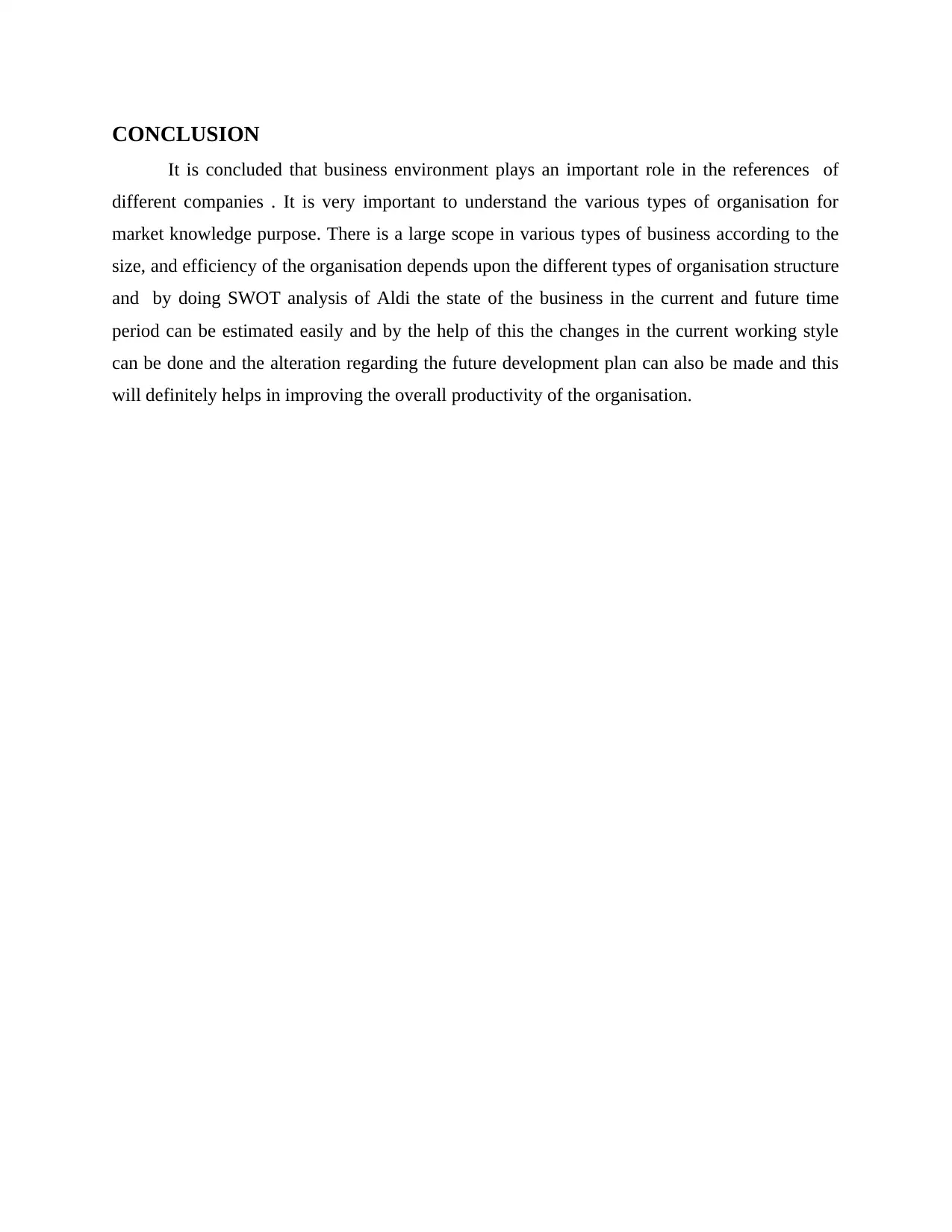
CONCLUSION
It is concluded that business environment plays an important role in the references of
different companies . It is very important to understand the various types of organisation for
market knowledge purpose. There is a large scope in various types of business according to the
size, and efficiency of the organisation depends upon the different types of organisation structure
and by doing SWOT analysis of Aldi the state of the business in the current and future time
period can be estimated easily and by the help of this the changes in the current working style
can be done and the alteration regarding the future development plan can also be made and this
will definitely helps in improving the overall productivity of the organisation.
It is concluded that business environment plays an important role in the references of
different companies . It is very important to understand the various types of organisation for
market knowledge purpose. There is a large scope in various types of business according to the
size, and efficiency of the organisation depends upon the different types of organisation structure
and by doing SWOT analysis of Aldi the state of the business in the current and future time
period can be estimated easily and by the help of this the changes in the current working style
can be done and the alteration regarding the future development plan can also be made and this
will definitely helps in improving the overall productivity of the organisation.
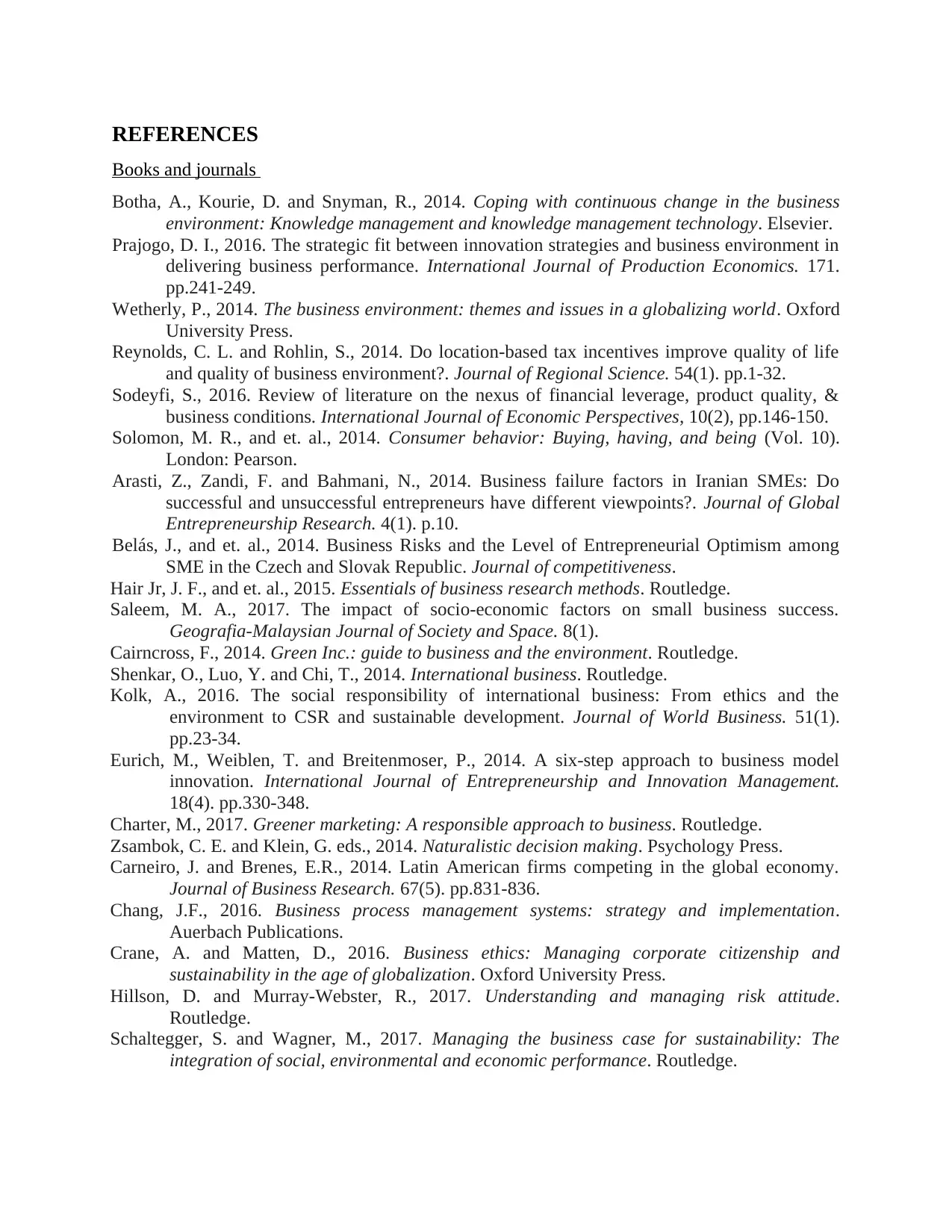
REFERENCES
Books and journals
Botha, A., Kourie, D. and Snyman, R., 2014. Coping with continuous change in the business
environment: Knowledge management and knowledge management technology. Elsevier.
Prajogo, D. I., 2016. The strategic fit between innovation strategies and business environment in
delivering business performance. International Journal of Production Economics. 171.
pp.241-249.
Wetherly, P., 2014. The business environment: themes and issues in a globalizing world. Oxford
University Press.
Reynolds, C. L. and Rohlin, S., 2014. Do location‐based tax incentives improve quality of life
and quality of business environment?. Journal of Regional Science. 54(1). pp.1-32.
Sodeyfi, S., 2016. Review of literature on the nexus of financial leverage, product quality, &
business conditions. International Journal of Economic Perspectives, 10(2), pp.146-150.
Solomon, M. R., and et. al., 2014. Consumer behavior: Buying, having, and being (Vol. 10).
London: Pearson.
Arasti, Z., Zandi, F. and Bahmani, N., 2014. Business failure factors in Iranian SMEs: Do
successful and unsuccessful entrepreneurs have different viewpoints?. Journal of Global
Entrepreneurship Research. 4(1). p.10.
Belás, J., and et. al., 2014. Business Risks and the Level of Entrepreneurial Optimism among
SME in the Czech and Slovak Republic. Journal of competitiveness.
Hair Jr, J. F., and et. al., 2015. Essentials of business research methods. Routledge.
Saleem, M. A., 2017. The impact of socio-economic factors on small business success.
Geografia-Malaysian Journal of Society and Space. 8(1).
Cairncross, F., 2014. Green Inc.: guide to business and the environment. Routledge.
Shenkar, O., Luo, Y. and Chi, T., 2014. International business. Routledge.
Kolk, A., 2016. The social responsibility of international business: From ethics and the
environment to CSR and sustainable development. Journal of World Business. 51(1).
pp.23-34.
Eurich, M., Weiblen, T. and Breitenmoser, P., 2014. A six-step approach to business model
innovation. International Journal of Entrepreneurship and Innovation Management.
18(4). pp.330-348.
Charter, M., 2017. Greener marketing: A responsible approach to business. Routledge.
Zsambok, C. E. and Klein, G. eds., 2014. Naturalistic decision making. Psychology Press.
Carneiro, J. and Brenes, E.R., 2014. Latin American firms competing in the global economy.
Journal of Business Research. 67(5). pp.831-836.
Chang, J.F., 2016. Business process management systems: strategy and implementation.
Auerbach Publications.
Crane, A. and Matten, D., 2016. Business ethics: Managing corporate citizenship and
sustainability in the age of globalization. Oxford University Press.
Hillson, D. and Murray-Webster, R., 2017. Understanding and managing risk attitude.
Routledge.
Schaltegger, S. and Wagner, M., 2017. Managing the business case for sustainability: The
integration of social, environmental and economic performance. Routledge.
Books and journals
Botha, A., Kourie, D. and Snyman, R., 2014. Coping with continuous change in the business
environment: Knowledge management and knowledge management technology. Elsevier.
Prajogo, D. I., 2016. The strategic fit between innovation strategies and business environment in
delivering business performance. International Journal of Production Economics. 171.
pp.241-249.
Wetherly, P., 2014. The business environment: themes and issues in a globalizing world. Oxford
University Press.
Reynolds, C. L. and Rohlin, S., 2014. Do location‐based tax incentives improve quality of life
and quality of business environment?. Journal of Regional Science. 54(1). pp.1-32.
Sodeyfi, S., 2016. Review of literature on the nexus of financial leverage, product quality, &
business conditions. International Journal of Economic Perspectives, 10(2), pp.146-150.
Solomon, M. R., and et. al., 2014. Consumer behavior: Buying, having, and being (Vol. 10).
London: Pearson.
Arasti, Z., Zandi, F. and Bahmani, N., 2014. Business failure factors in Iranian SMEs: Do
successful and unsuccessful entrepreneurs have different viewpoints?. Journal of Global
Entrepreneurship Research. 4(1). p.10.
Belás, J., and et. al., 2014. Business Risks and the Level of Entrepreneurial Optimism among
SME in the Czech and Slovak Republic. Journal of competitiveness.
Hair Jr, J. F., and et. al., 2015. Essentials of business research methods. Routledge.
Saleem, M. A., 2017. The impact of socio-economic factors on small business success.
Geografia-Malaysian Journal of Society and Space. 8(1).
Cairncross, F., 2014. Green Inc.: guide to business and the environment. Routledge.
Shenkar, O., Luo, Y. and Chi, T., 2014. International business. Routledge.
Kolk, A., 2016. The social responsibility of international business: From ethics and the
environment to CSR and sustainable development. Journal of World Business. 51(1).
pp.23-34.
Eurich, M., Weiblen, T. and Breitenmoser, P., 2014. A six-step approach to business model
innovation. International Journal of Entrepreneurship and Innovation Management.
18(4). pp.330-348.
Charter, M., 2017. Greener marketing: A responsible approach to business. Routledge.
Zsambok, C. E. and Klein, G. eds., 2014. Naturalistic decision making. Psychology Press.
Carneiro, J. and Brenes, E.R., 2014. Latin American firms competing in the global economy.
Journal of Business Research. 67(5). pp.831-836.
Chang, J.F., 2016. Business process management systems: strategy and implementation.
Auerbach Publications.
Crane, A. and Matten, D., 2016. Business ethics: Managing corporate citizenship and
sustainability in the age of globalization. Oxford University Press.
Hillson, D. and Murray-Webster, R., 2017. Understanding and managing risk attitude.
Routledge.
Schaltegger, S. and Wagner, M., 2017. Managing the business case for sustainability: The
integration of social, environmental and economic performance. Routledge.
⊘ This is a preview!⊘
Do you want full access?
Subscribe today to unlock all pages.

Trusted by 1+ million students worldwide
1 out of 13
Related Documents
Your All-in-One AI-Powered Toolkit for Academic Success.
+13062052269
info@desklib.com
Available 24*7 on WhatsApp / Email
![[object Object]](/_next/static/media/star-bottom.7253800d.svg)
Unlock your academic potential
Copyright © 2020–2026 A2Z Services. All Rights Reserved. Developed and managed by ZUCOL.





